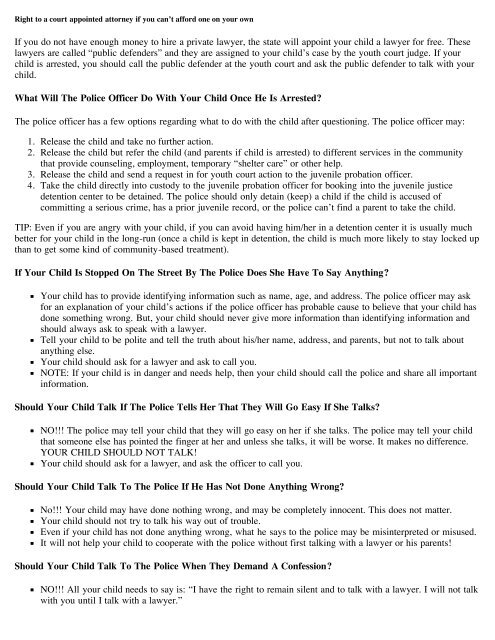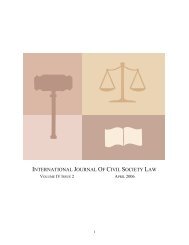Hurricane Katrina: Legal Issues - Columbus School of Law
Hurricane Katrina: Legal Issues - Columbus School of Law
Hurricane Katrina: Legal Issues - Columbus School of Law
Create successful ePaper yourself
Turn your PDF publications into a flip-book with our unique Google optimized e-Paper software.
Right to a court appointed attorney if you can’t afford one on your own<br />
If you do not have enough money to hire a private lawyer, the state will appoint your child a lawyer for free. These<br />
lawyers are called “public defenders” and they are assigned to your child’s case by the youth court judge. If your<br />
child is arrested, you should call the public defender at the youth court and ask the public defender to talk with your<br />
child.<br />
What Will The Police Officer Do With Your Child Once He Is Arrested?<br />
The police <strong>of</strong>ficer has a few options regarding what to do with the child after questioning. The police <strong>of</strong>ficer may:<br />
1.<br />
Release the child and take no further action.<br />
2.<br />
Release the child but refer the child (and parents if child is arrested) to different services in the community<br />
that provide counseling, employment, temporary “shelter care” or other help.<br />
3.<br />
Release the child and send a request in for youth court action to the juvenile probation <strong>of</strong>ficer.<br />
4.<br />
Take the child directly into custody to the juvenile probation <strong>of</strong>ficer for booking into the juvenile justice<br />
detention center to be detained. The police should only detain (keep) a child if the child is accused <strong>of</strong><br />
committing a serious crime, has a prior juvenile record, or the police can’t find a parent to take the child.<br />
TIP: Even if you are angry with your child, if you can avoid having him/her in a detention center it is usually much<br />
better for your child in the long-run (once a child is kept in detention, the child is much more likely to stay locked up<br />
than to get some kind <strong>of</strong> community-based treatment).<br />
If Your Child Is Stopped On The Street By The Police Does She Have To Say Anything?<br />
Your child has to provide identifying information such as name, age, and address. The police <strong>of</strong>ficer may ask<br />
for an explanation <strong>of</strong> your child’s actions if the police <strong>of</strong>ficer has probable cause to believe that your child has<br />
done something wrong. But, your child should never give more information than identifying information and<br />
should always ask to speak with a lawyer.<br />
Tell your child to be polite and tell the truth about his/her name, address, and parents, but not to talk about<br />
anything else.<br />
Your child should ask for a lawyer and ask to call you.<br />
NOTE: If your child is in danger and needs help, then your child should call the police and share all important<br />
information.<br />
Should Your Child Talk If The Police Tells Her That They Will Go Easy If She Talks?<br />
NO!!! The police may tell your child that they will go easy on her if she talks. The police may tell your child<br />
that someone else has pointed the finger at her and unless she talks, it will be worse. It makes no difference.<br />
YOUR CHILD SHOULD NOT TALK!<br />
Your child should ask for a lawyer, and ask the <strong>of</strong>ficer to call you.<br />
Should Your Child Talk To The Police If He Has Not Done Anything Wrong?<br />
No!!! Your child may have done nothing wrong, and may be completely innocent. This does not matter.<br />
Your child should not try to talk his way out <strong>of</strong> trouble.<br />
Even if your child has not done anything wrong, what he says to the police may be misinterpreted or misused.<br />
It will not help your child to cooperate with the police without first talking with a lawyer or his parents!<br />
Should Your Child Talk To The Police When They Demand A Confession?<br />
NO!!! All your child needs to say is: “I have the right to remain silent and to talk with a lawyer. I will not talk<br />
with you until I talk with a lawyer.”

















